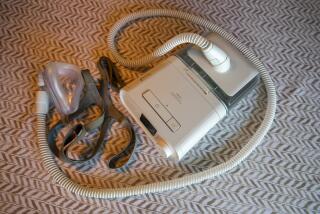FDA halts sales of vaginal mesh, unconvinced it’s safe or effective

- Share via
U.S. health regulators ordered two medical device companies to stop selling surgical mesh used in pelvic repair surgeries, saying there isn’t enough evidence that the product embroiled in thousands of lawsuits is safe or effective.
The Food and Drug Administration told Boston Scientific Corp. and the Danish company Coloplast “to stop selling and distributing their products in the U.S. immediately.” They were the last two companies selling surgical mesh for use during minimally invasive repair of pelvic organ prolapse, a common condition in women that develops when the muscles holding in the bladder and uterus weaken and the organs start to protrude from the vagina.
Vaginal mesh, which helps hold in the organs, was once made by 31 companies, including Johnson & Johnson, C. R. Bard and Endo International. The mesh was clouded by safety complaints after doctors started implanting it through the vagina in 2002, with complications including pain, infection and even death on rare occasions. The FDA re-categorized mesh as a high-risk device in 2016 and required the companies to prove its benefits in order to keep the product on the market.
“The FDA has determined that the manufacturers, Boston Scientific and Coloplast, have not demonstrated a reasonable assurance of safety and effectiveness for these devices,” the agency said in a statement.
Vaginal mesh generates about $25 million in annual sales for Boston Scientific, said Larry Biegelsen, an analyst at Wells Fargo & Co., who said the effect on the company should be manageable. Vijay Kumar, an analyst at Evercore ISI, said the setback could lead Boston Scientific to lower its 2019 revenue estimates.
Boston Scientific shares slid 4.3% to $36.17, while Coloplast’s American depositary receipts fell 2.5%. Coloplast has settled the lawsuits brought against it by women who said they were harmed by the devices. Boston Scientific has set aside more than $900 million for legal liabilities, with most of it tied to mesh lawsuits.
The companies have 10 days to submit their plans for withdrawing their devices, the agency said.
Boston Scientific decried the decision and said it would work with the agency to determine its next steps.
“We are deeply disappointed by the FDA’s decision,” said Kelly Leadem, a spokeswoman for the Marlborough, Mass., company. “The inaccessibility of these products will severely limit treatment options for the 50% of women in the U.S. who will suffer from pelvic organ prolapse during their lives.”
Vaginal mesh accounts for about 0.2% of group revenue for Coloplast, said company spokeswoman Lina Danstrup, who declined to comment further. The company generated $2.6 billion in sales last year.
Although some mesh makers — such as Coloplast — have settled all their cases, Boston Scientific still faces about 18,000 suits over the controversial implants. Most of those cases are in settlement negotiations, company officials said in a February filing with the U.S. Securities and Exchange Commission.
Other device makers, such as J&J, still face more than 34,000 claims their mesh devices damaged women’s organs and left them in severe pain, according to a February SEC filing. Unlike Boston Scientific and Endo, J&J hasn’t announced a settlement program. Instead, it is resolving suits on a case-by-case basis.
More to Read
Inside the business of entertainment
The Wide Shot brings you news, analysis and insights on everything from streaming wars to production — and what it all means for the future.
You may occasionally receive promotional content from the Los Angeles Times.









